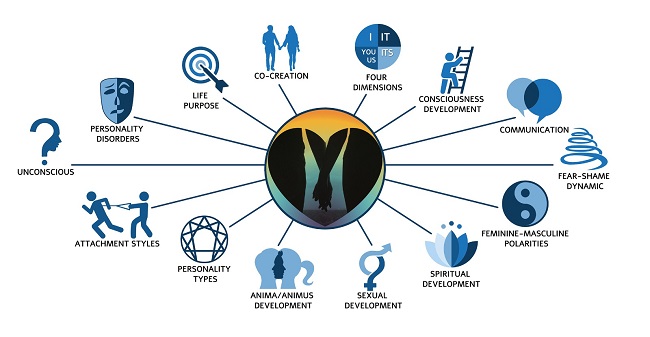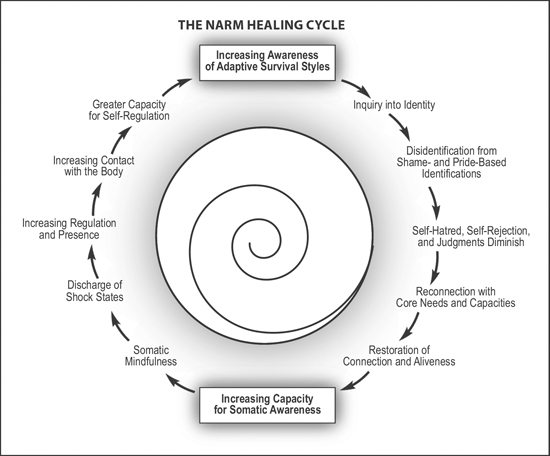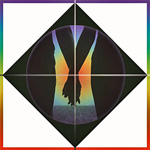
Click on the image to the left to register to join Martin and other Integral Relationship explorers for Session #11 of 12 practice Sessions and the IR Training Introduction.
View catch-up videos of previous Practice Sessions here.
Sunday, October 27
4:00 – 5:00 PM UTC (17:00 CEST, 9:00 AM PDT) NARM Healing Cycle
5:00 – 6:00 PM UTC (18:00 CEST, 10:00 AM PDT) Introduction to NARM Informed Integral Relationship Training #8
Click here and move the UTC slider to 4:00 PM to to convert 4:00 PM UTC to your local time zone.
Arrive up to 15 Minutes before we start for check-in and warm-up questions.
NARM Healing Cycle:
We will integrate exercises from Martin’s new book Integral Relationship Practice (also available as audible version) and the upcoming Integral Relationship Online Training #8, from Nov. 10, 2024 to May 18, 2025 with the NeuroAffective [sic] Relational Model (NARM) and their new book The Practical Guide For Healing Developmental Trauma, by Laurence Heller and Brad J. Kammer:
Topics:
– What is our authentic human state?
– What is The NARM Healing Cycle?
– Why do we all have Complex Developmental Childhood Trauma (C-PTSD)?
– Why can we only heal our relational childhood wounds in adult love relationships?
– How do we heal our C-PTSD in our love relationships?
– Restoration of our core capacities for connection, attunement, trust, autonomy, and love/sexuality.
– Feeling fully alive and fulfilled.
View catch-up videos of the previous five Sessions here.
5:00 – 6:00 PM UTC Introduction to NARM Informed Integral Relationship Training #8:
Introduction to the 26 Modules of the training.


NARM is the perfect complement to Martin’s work, as it supports us in healing past complex developmental trauma that often prevents us from co-creating healthy Integral Love Relationships.
NARM®, the “NeuroAffective Relational Method” for Healing Developmental Trauma is the perfect complement for the Integral (Relationship) Model.
Key aspects of NARM include:
1. Mindfulness-based approach: Emphasizes being present and aware of one’s thoughts, feelings, and bodily sensations.
2. Relational focus: Recognizes the importance of interpersonal relationships in healing trauma.
3. Integration of body and mind: Addresses both the psychological and physiological aspects of trauma.
4. Developmentally-oriented: Explores how early childhood experiences can impact adult functioning.

Key aspects of the Integral Relationship Model include:
1. Learning all relationship skills available to us today.
2. Healing our relationship wounds in relationships.
3. Growing in consciousness and co-creating with an equal partner along the seven chakras.
4. Awakening to our true nature and full human potential to make the world a better place.

NARM has five organizing developmental themes that Martin already integrated into his new book Integral Relationship Practice:
1. Connection: We feel that we belong in the world. We are in touch with our body and our emotions and capable of consistent connection with others.
2. Attunement: Our ability to know what we need and to recognize, reach out for, and take in the abundance that life offers.
3. Trust: We have an inherent trust in ourselves and others. We feel safe enough to allow a healthy interdependence with others.
4. Autonomy: We are able to say no and set limits with others. We speak our mind without guilt or fear.
5. Love-Sexuality: Our heart is open and we are able to integrate a loving relationship with a vital sexuality.
To the degree that these five basic needs are met, we experience harmony in our love relationships.
To the degree that these basic needs are not met, we develop shame and pride based survival styles to try to manage the disconnection and dysregulation.
We will explore how these five pride and shame based survival styles and the NARM Healing cycle fit into the 14 Essential Dimensions of the Integral Relationship Model in our 12 practice events from Sunday August 18. to November 3. 2024.
